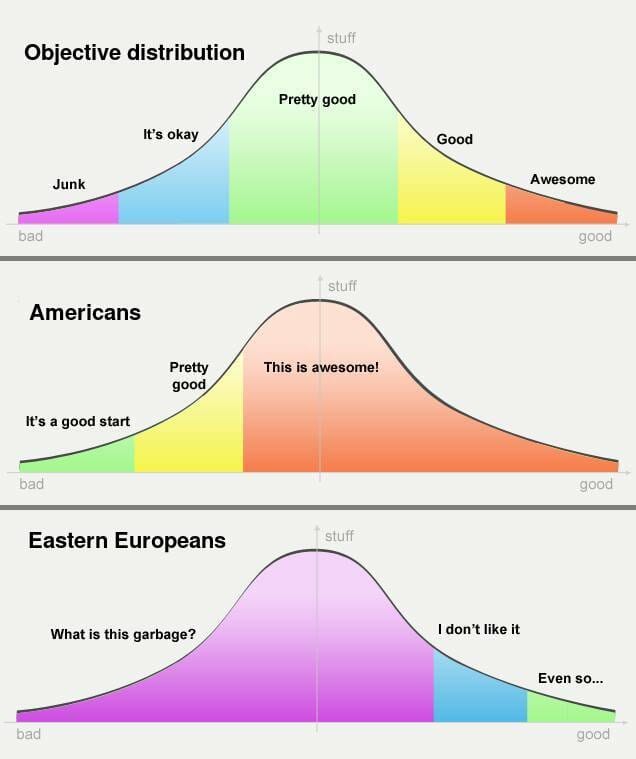Eastern European Guide to Writing Reference Letters
Excruciating. One phrase I often use to describe what it's like to read reference letters for Eastern European applicants to PhD and Master's programs in Cambridge.
Even objectively outstanding students often receive dull, short, factual, almost negative-sounding reference letters. This is a result of (A) cultural differences - we are very good at sarcasm, painfully good at giving direct negative feedback, not so good at praising others and (B) the fact that reference letters play no role in Eastern Europe and most professors have never written or seen a good one before.
Poor reference letters hurt students. They give us no insight into the applicant's true strengths, and no ammunition to support the best candidates in scholarship competitions or the admission process in general. I decided to write this guide for students so they can share it with their professors when asking for reference letters. Although reading letters from the region is what triggered me to write this, mist of this advice should be generally useful for many other people who don't know how to write good academic reference letters.

High-Level Goals
- Help the supervisor to make a case for admitting a student: The reference letter is very important in the whole admissions process. In competitive places in Europe, there is often competition not just between applicants, but also between different research groups and supervisors about whose student gets funding. Reference letters are often used as ammunition to justify decisions internally, and to determine who gets prioritised for various scholarship and funding competitions.
- Help put candidate's profile into context: If you write a reference letter from a region like Eastern Europe, keep in mind how difficult it is to compare candidates from wildly different education systems and backgrounds. Is someone with a 4.9/5.0 GPA from Hungary more impressive than someone with a 9.5/10.0 GPA from Serbia? Your job, partly, is to explain to the admissions committee what the student's achievements mean in a global context. Do not use abbreviations that are not internationally obvious. Do not assume the reader has ever heard of your institution. Explain everything.
Basic Hygiene and Format
- Confidentiality: Please do not ask the student to write their own recommendation letter. Sadly, many professors do it, but this is not acceptable, especially for the best students who apply to a top institution. You can also assume your reference letter is confidential. Don't share it with the student directly (Why? You probably want to write nicer things than you are comfortable sharing with them directly.)
- Length: Reference letters for the best candidates are often 2 full pages long. Something that's half a page or just two paragraphs is interpreted as 'weak support' or worse.
- Format: Although plain text is often accepted on submissions forms, when possible, please submit a PDF on letter-headed format (where the institution's logo, name, etc appear on the header). The format should follow the layout of a formal letter. You may address it 'To Whom It May Concern,' or 'To the Admissions Committee,' or to 'Dear Colleagues,' or if you know the potential supervisor, by all means make it personal, address it to them. Obviously sign the letter with your name and title.
- Basic contents: Make sure that the letter mentions your full job title, affiliation, the candidate's full name, and the name of the programme/job/scholarship they are applying for.
Contents
Below is an example structure that is often used. (I'll use Marta as an example because I don't have a student called Marta so it won't get personal)
- Introduction: A few sentences mentioning who you're recommending and for what program, for example "I'm writing to recommend Marta Somethingova for the Cambridge MPhil in Advanced Computer Science." The second sentence should clearly indicate how strongly you are recommending this candidate. Factual statements signal this is a lukewarm recommendation (they asked me and I had to write something). To convey your enthusiasm, you can write something like ''Marta is the strongest student I've worked with in the last couple years".
- Context, How do I know Marta: Since when, in what capacity and how closely you have known Marta. This is important - a reference from a thesis supervisor who has worked with the student for a year is more informative than a reference from someone who only met them in one exam. If you've done a project together, include details on how many times you've met, etc. What was the project about, how challenging was it, what was the student's contribution.
- Marta's academic results/performance, in context: How good is Marta, compared to other students/persons in a similar context? Be aware that whoever is reading your letter may not know your country's marking scheme, so something like a GPA of 4.8 out of 5 isn't all that informative. Try to put that in context as much as you can: how many other students would achieve similar results in your institution? Best if you can give a rank index (#8 out of a cohort of 300) relative to the whole cohort. Context on your institution: Similarly, assume the reader has no idea how selective your institution is, so include a few details like 'top/most selective computer science program in the country' or something. Try to put this in context by making a prediction about how well the student will do in the course you're recommending them to, or how well they would have done in a more challenging program. Do your research here, if you can.
- Details of research/project, if applicable: If you're recommending someone who has worked on a research project with you, include enough technical information (ideally with references or pointers) so that the reader can judge how serious that project was, and what Marta's contribution was. Don't worry, nobody is going to steal your research idea if you write it down in a recommendation letter - we are way too busy reading reference letters to do any research :D
- Marta's specific strengths: What quality of Marta do you think will be first noticed in an interview? Is Marta particularly good at understanding complex ideas fast? Is Marta very good at getting things done? Or writing clean code, mentoring others? Where appropriate, try to focus on talent and potential, before commenting on diligence or effort: If the first thing you write is "Marta is very hard working" it may be misinterpreted as a covert way of saying she tries very hard because she is not as good as the students who just get it without much effort. Be conscious of possible gender stereotypes that often come up here. E.g. she is quiet. Make a prediction about Marta's career prospects: She's on a good track to an academic career/well positioned for a career in industry. Please consider what the people reading your letter will want to see. If you recommend someone for an academic pure Maths program, you don't want to say the student is well positioned to end up in a boring finance job. If you feel like you MUST, you can include relative weaknesses here, but please phrase these as opportunities of growth, and what Marta needs to improve.
- Other/extracurricular activities: If you're aware of other things the student is doing - like organising meetups, volunteering, competitions, whatever - you can include them here if you feel they are relevant. Your job, again, is to put these in context.
- Further background on Marta's education history: This may be useful to support candidates who achieved impressive things in their country, but whose achievements may not make a lot of sense in an international context. For example, did they go to a very selective secondary school known for some specialization? Or, to the contrary, did they do exceptionally well despite not having access to the best education? Did they participate in country-specific olympiads or competitions? If so, what do those results mean? How many students do those things? Did they get a scholarship for their academic performance? If so, how many students get those? Did they participate in some kind of university activity? If so, what's the relevance of that? The most important assumption to remember is: Whoever reads the applicant's CV or your recommendation letter will know absolutely nothing about your country. You have to fill in the blanks, and explain everything from the ground up. NO ACRONYMS!
- Your mini-CV: It's worth including one paragraph about yourself, the referee. What is your job title, how long you've been doing what you're doing, what's your specialty, etc. The purpose of this is to prove you are qualified and able to spot talent. Make this as internationally attractive and meaningful as you can.
- Conclusion: Here is your chance to reiterate the strength of your recommendation. If you think you're describing a not-to-miss candidate, say so explicitly. One sentence we often include here is along the lines of 'If Marta were to apply for a PhD/Masters under my supervision I would not hesitate to take her as a student'.
Relative ranking of students
- Often, reference submission websites ask you to place the student in the top X% of students you've worked with. More depends on this than you might think. Be honest, but be aware that these judgments often go into a formula for scoring or pre-filtering applications. In a competitive program, if you say someone is top 20%, that is likely a death sentence for the student's chances of getting a scholarship. Again, don't lie, just make sure you don't put the student in a lower bucket than they really deserve to be in.
Writing style
- Be aware of cultural differences in how we praise others and give direct feedback to/on colleagues. I often recommend the Culture Map book by Erin Meyer on this topic. Though individuals are individuals, by and large, those who socialise in the U.S. Academic system tend to write recommendation letters with a higher baseline level of enthusiasm. If you feel your letter is too positive, that may be appropriate compensation for these differences, so long as your letter is honest, of course.
- Writing style and tone are the most difficult to get right if you haven't seen examples before. I suggest you write a draft a couple weeks before submitting a letter, and then return to it before submitting. Re-reading after a week often allows you to better notice where the letter isn't conveying what you wanted.
- Ask for help! If you have a candidate you enthusiastically support, don't be afraid to ask for help writing the reference letter. Ideally, ask someone who is experienced, doesn't know the candidate, and who is not part of the decision making at the institution the student is applying.
In summary, please take time to write strong recommendation letters for your best students. There may not be many students at your institution who apply to top programs, but those who do are likely the ones who really need and deserve your attention.
